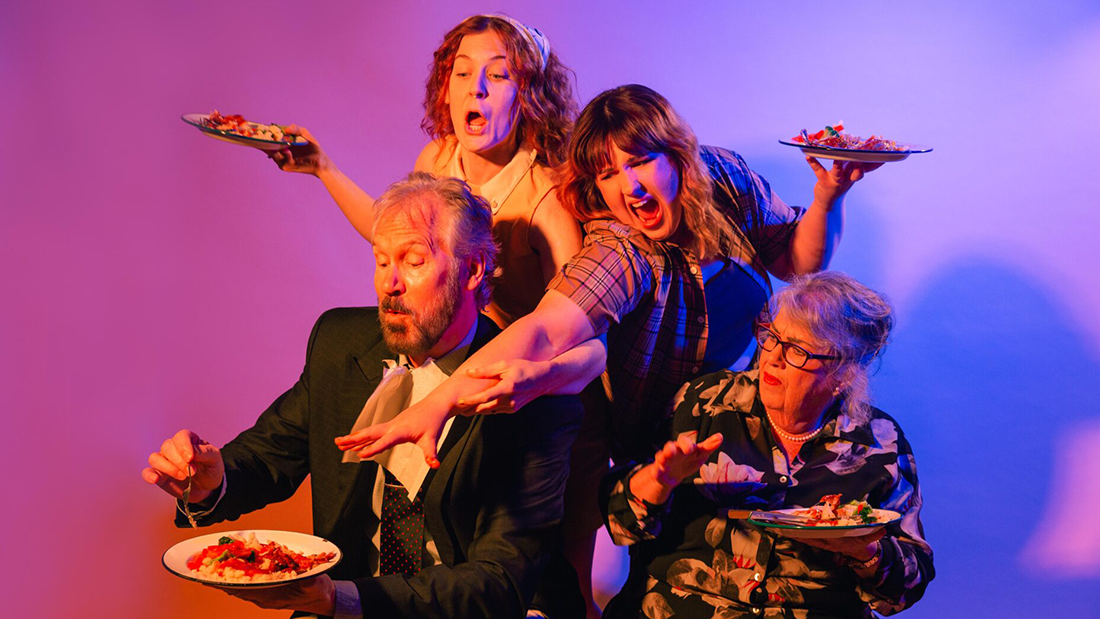
Review: ‘We’ll Always Have Bali’ at The Blue Room Theatre
We’ll Always Have Bali at The Blue Room Theatre
Friday, July 14, 2023
8/10
Boorloo’s creative prowess stands firmly on display in all its audaciously excellent glory in We’ll Always Have Bali, a play as exceptionally crafted as it is painfully authentic.
Following the Wainwright family, as they desperately attempt to enjoy a normal ‘Christmas’ (in July!) while they each struggle amid a storm of personal struggles and conflicting politics, writer Lily Baitup’s first full length play artfully and compassionately confronts issues of disfunction, intergenerational trauma and resentment, and the ever-challenging notion of loving and forgiving one’s family.
Entering the Blue Room Studio Theatre, ticket holders were immediately greeted with an exceptionally crafted stage. Featuring a family living and dining room, and a 70s kitchen to make any grandparents immediately proud, pains were clearly taken to create a space of domestic sanctuary, down to the everyday minutiae of knickknacks and kitschy pillows. Designer Willim Gammel outdid themselves in this physical ode to the ancestral home, establishing an environment that immediately transported audiences into the characters’ world.
In partnership with Gammel’s dynamic designs, director Riley Jackson led their five-person cast to fill every inch of the space with an authentic presence, and the kind of family relationships and intimacy that brought the stage and its furnishings to life. Amber Gilmore as Charlie and Phoebe Eames as Georgia both embodied the intensity of sibling love that exists between vastly different sisters, torn between their values and connection to their parents. Their on-stage dynamic embodied a compelling combination of unconditional love, and yet total frustration for, and misunderstanding of each other.
Likewise, both actors’ relationships with father ‘Red’ (Joshua Crane) and mother ‘Belinda’ (Kim Parkhill) could have emerged directly from the inner walls of many intergenerational Australian households. Crane’s embodiment of the conservative family-man-come-politician was an interesting exercise in misdirection and a kind of sincere villainy. And Parkhill’s embodiment of the attentive and caring mother, trapped between the vastly different generational values of her mother, which she often tries to break, and her children, which she occasionally struggles to understand, was an empowering representation of the classic domestic figure.
Emma Kirby’s performance as the cynical and controlling grandmother Irene was masterful, connecting with, and repelling each member of her family as she continually struggles to reconcile her own personal grievances, values and beliefs against the pains she witnesses in her children. Kirby’s youthfulness and energy impressively disappeared entirely in the tired and drawn character of Irene.
Commendation must also go to lighting designer Amber Lorenzi, who filled the domestic space with movement, complimenting the actors with the creation of warmth and dynamism across the diegetic and non-diegetic lighting features of the space.
There were several moments where the complexity of the script felt lost in its own intricacies, and several moments of authenticity moved into a more drawn-out cliché (particularly in moments of political debate between the ‘liberal youth’ and the ‘conservative father’). It also would have been great to see the underlying subtext about Georgia’s queer journey, and the repeatedly mentioned ‘Uncle Ben,’ come to greater light, as these stories became muddled amid other contemplations.
We’ll Always Have Bali was one of the strongest productions to grace The Blue Room Theatre stage this year, and a testament to the strengths of its creative teams. For those looking for an exciting new play that gently balances the agonies of family relationships, with its comedic dysfunctionalities, in a world of artfully simulated nostalgia, this is not a play to miss.
BEC WELDON
